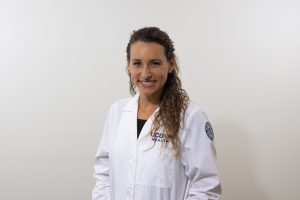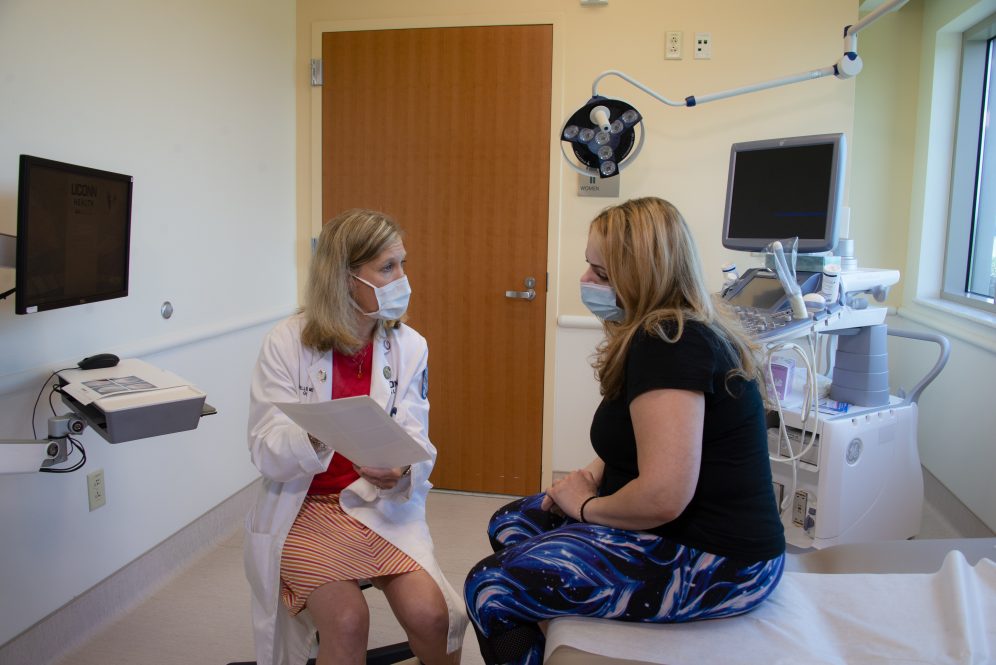Dr. Amanda Ulrich is the newest member of the Minimally Invasive Gynecologic Surgical Division (MIGS) at UConn Health’s Women Center. Dr. Ulrich joins Dr. Anthony Luciano and Dr. Danielle Luciano, all of whom are fellowship-trained in minimally invasive gynecologic surgery.

Those who are fellowship-trained in minimally invasive gynecologic surgery are trained with advanced surgical skills. The MIGS Division at UConn Health focuses on the care and treatment of women with endometriosis, uterine fibroids, abnormal uterine bleeding, infertility, chronic pelvic pain, and all gynecologic conditions.
Inspired by both Dr. Luciano’s during her OBGYN residency at UConn Health, Dr. Ulrich completed a fellowship in minimally invasive gynecologic surgery at Albert Einstein College of Medicine/Montefiore Hospital. After the fellowship, Dr. Ulrich rejoined the faculty at UConn Health as an Assistant Professor of Obstetrics & Gynecology and the Site Director of the Fellowship in Minimally Invasive Gynecologic Surgery.
For patients like J. Khuu, 49 of Simsbury, surgery gave normalcy back to her life, pain-free. Khuu had extreme pain in her lower right abdomen that had been lingering for a long time. The pain had gotten so bad that she visited the Emergency Department (ED) at UConn John Dempsey Hospital.
“I was very pleased with the experience in the ED, it was very fast and everything they needed including the CT scan was right there to provide me with a diagnosis,” says Khuu.
The ED identified a very large fibroid and Khuu was referred to Dr. Ulrich who, after a workup determined it would be best to proceed with surgical management. At that time, Dr. Ulrich had not seen endometriosis in tests but suspected it may be there.
Endometriosis is the presence of endometrial glands and stroma outside the uterus that can lead to chronic pain and infertility. Dr. Ulrich explains endometriosis affects 10-15% of adult women, 70+% of women with chronic pelvic pain, and 25-75% of adolescents with pelvic pain.
Patients may experience pelvic pain, painful periods, pain with intercourse, trouble becoming pregnant or infertility, pain with bowel movements or painful bladder symptoms, abnormal uterine bleeding, or no symptoms at all.
According to Dr. Ulrich, determining the best approach to the treatment of endometriosis can depend on multiple factors; including patient goals and symptoms, age, fertility goals, and desire for uterine preservation. There are medical management and surgical management options as well as non-pharmacologic options for associated pain syndromes.
Dr. Ulrich goes on to explain, that there are multiple pharmacologic treatment options in many forms including pills, injections, patches, vaginal rings, implants, and intrauterine devices. The treatments are aimed at decreasing or stopping menstruation and are all equally effective in head-to-head clinical trials, achieving about 60-80% improvement in symptoms.
Patients who do not respond to medical suppressive therapy are scheduled for surgery. The type of surgery performed and the patient’s age changes the success rate and chance of endometriosis recurrence. Medical therapy is strongly recommended after surgery to avoid recurrence of disease and repeated surgical procedures.
“The pain was unbearable, it was like I was in labor,” says Khuu. “I agreed with Dr. Ulrich to take out the uterus.”
Having had C-sections in the past, Khuu thought this was going to be major surgery until Dr.Ulrich explained the surgery that would be performed and how it could be done with a minimally invasive approach.
“I was amazed, I didn’t even know this type of minimally invasive procedure even existed,” says Khuu.
During the surgery, Dr. Ulrich found endometriosis which explained what had been causing the pain for so many months. As an expert in this type of surgery, she was able to excise all of the endometriosis and have the cells tested to confirm that it was indeed endometriosis.
Khuu’s friends had warned her that removing her uterus would be major surgery and recovery. However, with minimally invasive surgery, she was able to go home the same day. There were only three small incisions and she had pain that was manageable requiring only Tylenol/Ibuprofenonly Tylenol. Two weeks after her surgery, she was fully recovered and pain-free for the first time in many months.
“The whole experience was wonderful, and I was astonished at how easy this procedure and the recovery was,” says Khuu. “I highly recommend Dr. Ulrich, everything was as she had explained it.”
The MIGS division at UConn Health has the privilege of partnering with Jackson Laboratory to further study and understand endometriosis which will hopefully lead to further development of treatment options in the future.
“Fellowships in minimally invasive gynecologic surgery offer more advanced training in the medical and surgical management of endometriosis, and we recommend that patients who suspect they have endometriosis seek treatment from these specialists,” says Dr. Ulrich. “We have three fellowship-trained physicians and we are pleased to be able to offer care to those who are experiencing gynecological issues.”



